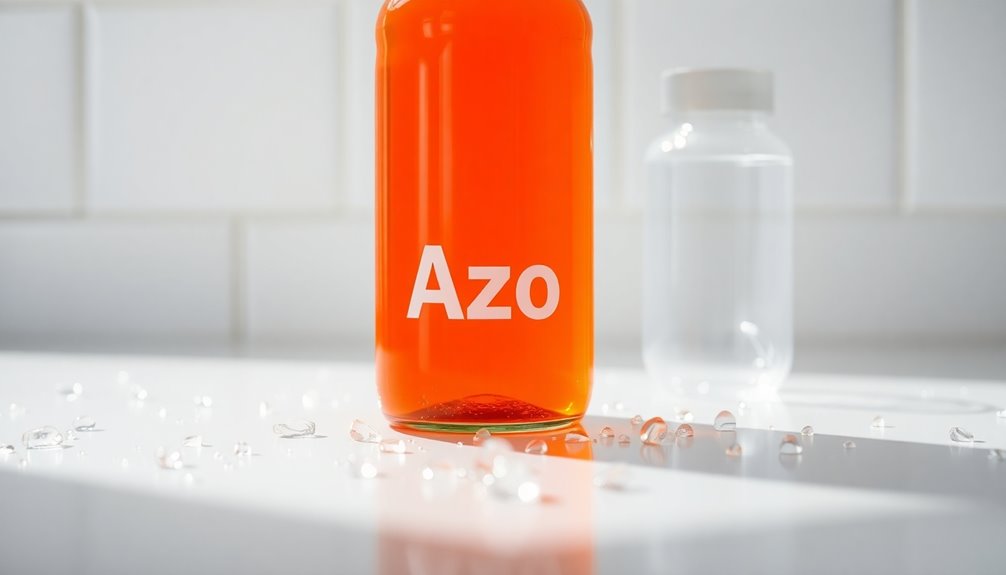Azo won't affect your urine culture results for UTIs, so you can breathe easy. It primarily provides symptom relief, but it doesn't treat the infection itself. However, be aware that Azo can lead to false positives on some urine tests, like dipstick tests for leukocyte esterase, which may create confusion during diagnosis. To guarantee clear results, it's best to stop taking Azo 48 hours before your urine culture. Always inform your healthcare provider about any medications you're using. If you want to learn more about how to manage UTIs effectively, there's more important info ahead.
Key Takeaways
- Azo does not affect urine culture accuracy; it provides symptom relief without treating the underlying infection.
- Urine cultures remain the most reliable method for diagnosing UTIs, even when Azo is used.
- Azo can cause urine discoloration, but this does not impact urine culture results.
- To ensure accurate culture results, it's best to wait 48 hours after stopping Azo before testing.
- Inform healthcare providers about Azo usage prior to testing to avoid misinterpretation of urine tests.
Understanding Azo and Its Use

When you're dealing with the discomfort of a urinary tract infection (UTI), Azo can provide quick relief from symptoms like burning and urgency. This over-the-counter pain reliever contains phenazopyridine, which targets the mucosa of your lower urinary tract, helping alleviate irritation.
While it's effective for up to two days, remember that Azo doesn't treat the underlying infection.
One thing to keep in mind is that Azo can cause your urine to turn a reddish-orange color. This harmless change can stain clothing and contact lenses, so be cautious.
While you might feel some relief, it's vital to consult medical help if your symptoms persist or worsen. Azo can mask the severity of a UTI, potentially delaying proper treatment.
Additionally, Azo can interfere with urine tests, particularly by causing false positives for leukocyte esterase. This means that urine culture and sensitivity tests become more reliable for diagnosing UTIs while you're using Azo.
Understanding these factors is important for effectively managing urinary tract infections and ensuring you receive appropriate care.
How Azo Impacts Urine Tests

Azo's effectiveness in relieving UTI symptoms can complicate the diagnostic process due to its effects on urine tests. When you take Azo, it can turn your urine orange, which may lead to confusion during testing. Specifically, its presence can interfere with dipstick tests, resulting in false positives for leukocyte esterase. This disruption complicates the diagnosis of urinary tract infections (UTIs), making it important to rely on urine cultures for accurate results.
Here are some key points to take into account:
- Azo doesn't prevent urine testing for UTIs but skews dipstick reliability.
- Inform your healthcare professional about Azo usage before testing.
- Understanding Azo's effects is critical for accurate diagnosis and treatment.
If you're experiencing UTI symptoms and taking Azo, it's important to communicate with your healthcare provider. This way, they can interpret your test results correctly and guarantee you receive the appropriate care.
Reliable Testing Options Available

Considering the challenges posed by Azo in urine testing, urine cultures stand out as a reliable option for diagnosing urinary tract infections (UTIs).
Unlike dipstick tests, which can yield false results due to Azo's interference, urine cultures can accurately confirm infections regardless of medication use. A culture that identifies pathogens at 100,000 CFU/ml indicates an active infection, while counts between 10,000-100,000 CFU/ml may suggest contamination rather than a true UTI.
To guarantee accurate culture results, it's vital to use a proper clean catch midstream specimen collection technique. This minimizes the risk of contamination, which could skew the results and mislead healthcare providers.
Regular education on the impact of medications like Azo on testing protocols is essential for enhancing patient care and diagnostic accuracy.
Common Misconceptions About Azo

Amid the confusion surrounding urinary tract infection (UTI) treatments, many patients hold misconceptions about Azo (phenazopyridine).
While Azo provides relief from urinary symptoms, it doesn't treat the underlying infection. This misunderstanding can lead to reliance on Azo without pursuing proper treatment.
Furthermore, some believe that taking Azo can prevent accurate urine testing for UTIs. In reality, Azo doesn't stop testing but can interfere with urine dipstick results, particularly affecting leukocyte esterase readings.
Healthcare professionals stress that urine cultures remain the most reliable diagnostic tool, as they're not impacted by Azo.
To clarify, here are some common misconceptions about Azo:
- Azo prevents accurate urine culture testing for UTIs.
- Azo treats the underlying infection causing the UTI.
- Urine dipstick tests remain unaffected by Azo.
Understanding these points is essential for effective UTI management.
Continuous education for both patients and healthcare professionals helps prevent misinterpretation and guarantees timely diagnosis and treatment.
Don't let misconceptions about Azo affect your UTI care; always consult with your healthcare provider for accurate information.
Medical Guidelines for Testing

When managing urinary tract infections (UTIs), understanding medical guidelines for testing is vital. Urine cultures remain the most reliable method for diagnosing UTIs, especially for patients taking Azo (phenazopyridine).
While Azo can turn your urine orange, it doesn't affect the accuracy of urine cultures, making them essential for an accurate diagnosis. Healthcare professionals recommend avoiding dipstick tests while you're on Azo, mainly due to the potential for false positives, particularly with leukocyte esterase readings.
If you present with classic UTI symptoms, you mightn't need an initial dipstick test since the likelihood of infection is around 90%. Instead, urine cultures should be prioritized in these cases.
Proper education for both you and healthcare providers is vital. Understanding how Azo can impact testing protocols guarantees timely and appropriate treatment for UTIs.
By prioritizing urine cultures over dipstick tests, you can help your healthcare team make informed decisions, streamline your treatment process, and achieve a quicker recovery.
Importance of Accurate Diagnosis

Getting an accurate diagnosis for a urinary tract infection (UTI) is essential for effective treatment.
You need to be aware that certain medications, like Azo, can impact urine testing results, potentially leading to misunderstandings.
Reliable testing methods, including urine cultures, guarantee you receive the right care based on your specific condition.
Reliable Testing Methods
Accurate diagnosis is crucial for effectively treating urinary tract infections (UTIs), and reliable testing methods play a key role in this process. Urine cultures are one of the most dependable methods for diagnosing UTIs, especially when you present with classic symptoms. They can confirm the presence of bacteria, even when medications like phenazopyridine (Azo) are involved, which can skew results in dipstick tests.
To guarantee accurate results, consider the following reliable testing methods:
- Microscopy and urine cultures: These methods provide more precise information than dipstick tests.
- Proper specimen collection techniques: Using a clean-catch midstream method minimizes contamination, enhancing the reliability of urine culture results.
- Understanding testing limitations: Knowing when to use urine cultures is critical for managing bladder infections effectively.
Impact of Medications
Medications like Azo can greatly impact the diagnosis of urinary tract infections (UTIs), making it important to understand their effects.
While Azo, or phenazopyridine, doesn't prevent urine cultures from being performed, it can interfere with dipstick tests. This interference can lead to misleading results, especially concerning the leukocyte esterase readings. If you're taking Azo, false positives may complicate your diagnosis, making it essential for medical professionals to recognize its presence in your urine.
Moreover, Azo can turn your urine orange, a change that could mislead laboratory personnel if it's not communicated properly. This color change can easily be misinterpreted during testing, further complicating the diagnosis of UTIs.
To guarantee an accurate evaluation, utilizing urine cultures is important, as they're more reliable than dipstick tests.
Education for medical professionals on the effects of Azo is crucial. By understanding how Azo influences test results, they can avoid unnecessary delays in diagnosing urinary tract infections and ensure you receive the right treatment promptly.
Frequently Asked Questions
Will AZO Mess up a Urine Culture?
Azo won't directly mess up a urine culture, but it can cause issues with dipstick tests, particularly with leukocyte esterase readings.
If you're taking Azo, it's best to rely on urine cultures for accurate diagnosis instead of dipstick tests.
Make sure to inform your healthcare provider about using Azo before getting tested.
Can AZO Cause False Positive Leukocytes?
Think of Azo as a magician, masking the real issue.
Yes, Azo can cause false positive leukocytes on urine dipstick tests. While it's great for easing discomfort, its orange hue may trick tests into thinking there are more leukocytes than there really are.
This could lead to unnecessary treatments or confusion. If you're on Azo, relying solely on dipstick tests isn't the best idea; urine cultures provide a clearer picture.
What to Avoid Before a Urine Culture Test?
Before a urine culture test, you should avoid taking Azo, as it can change urine color and affect test accuracy.
Stay hydrated, but don't overdo it right before the test to keep urine concentrated.
Skip any vaginal products, like douches or creams, within 24 hours prior.
Also, steer clear of certain foods, such as asparagus or beets, and any supplements that could alter urine color or pH, impacting your results.
What Can Affect Urine Culture Results?
Several factors can affect your urine culture results.
Medications, like Azo, can change your urine's color and potentially lead to misinterpretation. Sample contamination from your skin during collection may also produce false positives.
Timing matters too; early morning samples are often more concentrated, providing better accuracy.
Finally, remember that a negative nitrite test doesn't rule out a UTI, as various factors can impact culture outcomes. Proper collection techniques are key for reliable results.
Conclusion
In conclusion, while Azo offers temporary relief, it can cloud your urine culture results, complicating an accurate diagnosis. So, steer clear of self-diagnosis and seek professional advice if you suspect a UTI. Prioritize proper testing to guarantee precise prescriptions and prompt recovery. Remember, clarity counts—don't let colorful concoctions compromise your care! Stay informed and make intelligent choices for your health. Trust in thorough testing for the best outcomes in your urinary health journey.








